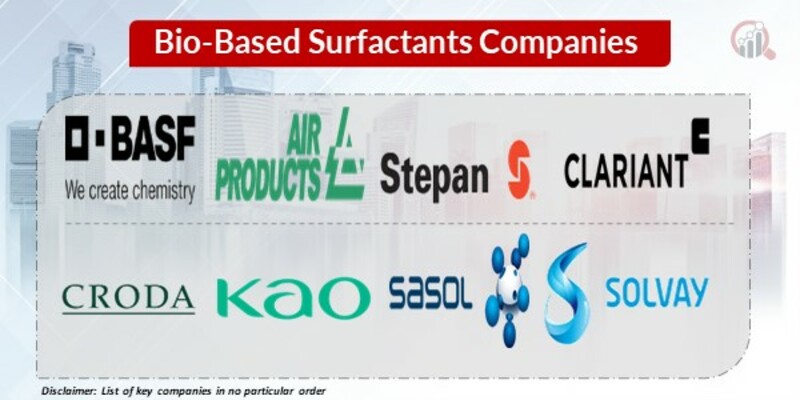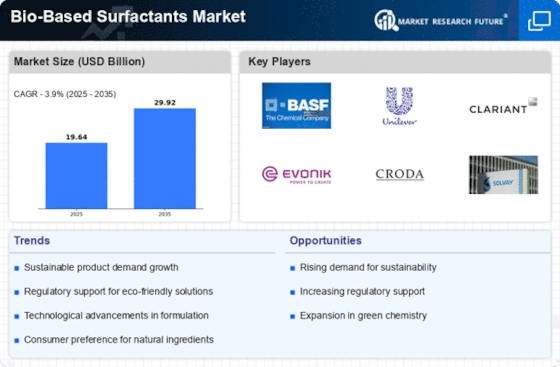Top Industry Leaders in the Bio-based Surfactants Market
 The bio-based surfactants market is bustling with innovative strategies and fierce competition. Players are vying for market share, employing diverse tactics to stand out. Let's delve into this dynamic landscape:
The bio-based surfactants market is bustling with innovative strategies and fierce competition. Players are vying for market share, employing diverse tactics to stand out. Let's delve into this dynamic landscape:
Bio-based Surfactants Market Strategies Adopted:
-
1. Product Expansion & Diversification: Companies like Stepan Chemical, BASF, and Croda International are focusing on expanding their bio-based surfactant portfolios by introducing new product lines tailored to specific applications like home care, personal care, and food & beverage. -
2. Sustainability Partnerships & Certifications: Collaboration with NGOs and certification bodies like Ecocert and USDA Organic strengthens green credentials and attracts environmentally conscious consumers. Partnerships with agricultural cooperatives for feedstock sourcing foster supply chain security and social responsibility. -
3. Technological Advancements: Investing in biotechnology research and development leads to the creation of next-generation bio-based surfactants with improved performance, lower production costs, and wider functional versatility. -
4. Mergers & Acquisitions: Strategic acquisitions allow established players to access new technologies, distribution channels, and geographic markets. Notable examples include Glatfelter's acquisition of ABITEC and Croda International's purchase of Seppic. -
5. Cost Optimization & Efficiency: Streamlining production processes, increasing feedstock utilization, and building internal capabilities for key ingredients like enzymes and fermentation technologies lower production costs and enhance competitiveness.
Factors for Market Share:
-
1. Geographic Footprint: Presence in key growing markets like Asia-Pacific and Latin America offers a significant advantage. Companies like Ecogreen Oleochemicals and Wilmar are aggressively expanding their regional footprint. -
2. Application Specialization: Focusing on specific end-use industries like personal care or oil & gas with tailor-made solutions builds brand loyalty and expertise. Evonik has carved a niche in the high-performance lubricants segment with its bio-based surfactants. -
3. Brand Recognition & Customer Relationships: Established brands like BASF and Stepan Chemical leverage their reputation and long-standing customer relationships to gain market share. Smaller players counter by offering customized solutions and flexible pricing models. -
4. Regulatory Landscape: Stringent environmental regulations favoring bio-based alternatives, like the EU's REACH Regulation, create market opportunities for compliant players.
Key Players
-
BASF SE (Germany)
-
Air Products and Chemicals, Inc (US)
-
Stepan Company (US), Clariant (Switzerland)
-
Croda International PLC (UK)
-
Kao Corporation (Japan)
-
Sasol (South Africa)
-
Galaxy Surfactants Ltd (India)
-
Akzo Nobel NV (Netherlands)
-
Solvay (Belgium)
-
Sirius International BV (Netherlands)
-
Enaspol AS (Czech Republic)
Recent Developments:
-
August 2023: The European Union proposed stricter regulations on the use of certain synthetic surfactants in household products, further boosting demand for bio-based alternatives. -
September 2023: Croda International unveiled its new bio-based surfactant line for the cosmetics industry, offering natural foaming and emulsifying properties for sustainable personal care products. -
October 2023: Stepan Company announced a strategic partnership with a startup specializing in bio-based fermentation technologies to accelerate the development of novel biosurfactants for diverse industries. -
November 2023: BASF expanded its production capacity for bio-based surfactants in Asia to cater to the growing demand in the region. -
December 2023: A consortium of leading research institutions received funding to develop a new generation of bio-based surfactants from marine microorganisms, potentially unlocking new avenues for sustainable cleaning solutions.











